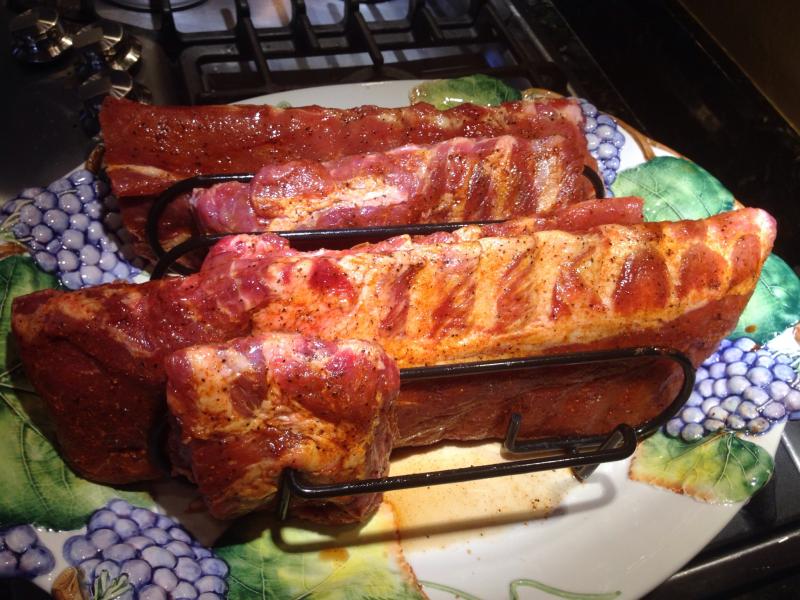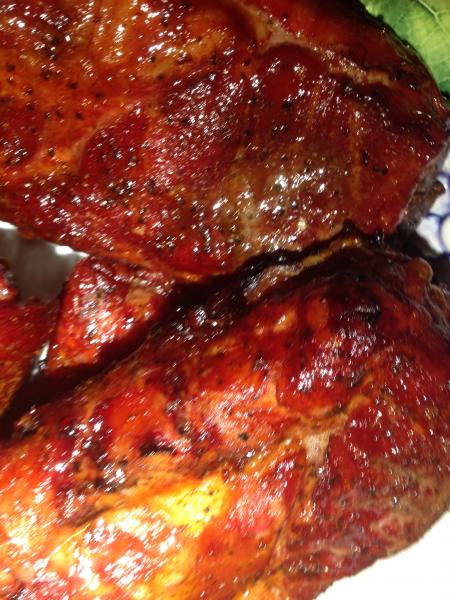Re: Official 2017 BBQ, Smoking, Grilling, Baking and Beer thread
Corned Beef (Update)
So I wanted to update my previous corning recipe (See
Post #265) with some new research and thoughts that I had. Food safety is important and I'm always very clean when I cook. So, in researching corned beef recipes, I noted that most use some form of nitrite based preservative. Most notably, Prague Powder #1 (also known as pink salt #1, quick cure #1, sal rose, etc) is used a lot for brined/cured meats. Prague Powder #1 is essnetially 6.25% sodium nitrite, 93.75% sodium chloride and some red dye #1 (to make it pink). The directions for use call for 1 level teaspoon per gallon of brining solution. And the reason for it's use is quite specific -
Botulism
Botulism is a sickness caused by the toxin generated from the
Clostridium botulinum bacteria.
C. botulinum is found
everywhere in the environment. It is a gram-negative (that's a type of identifying stain used to classify bacteria), anaerobic and spore forming motile bacteria that produces several different toxins, three of which are very harmful to humans. Some of the defining characteristics of
C. botulinum is that it needs anaerobic (no oxygen) conditions to reproduce itself and, if conditions are not right, it will form a basically impenetrable spore to protect itself until conditions are right. The disease botulism comes in many different forms (food botulism, wound botulism and infant botulism) but they are all characterized as a disease of progressive paralysis that can be (although typically isn't) fatal and takes weeks of recovery time. So, botulism can develop very easily in liquid cure meats....so what do I do with my corned beef (cuz I'm too cheap to throw it away)?
Light-bulb moment -
Pressure Cooker!!
So, as it turns out,
C. botulinum is not that hard to kill! The bacteria itself will be killed at temperatures above 140F and the toxins are inactivated and destroyed at 212F (100C). So, boiling the corned beef will kill both the bacteria AND the toxins. But what about the spores? Well, those little buggers can survive to quite high temperatures, around 240F, before being destroyed. And so, this is where the pressure cooker comes in.
As it should so happen, I have a very high quality electric pressure cooker that I rarely use. It's a nice little Cuisinart model that can brown/saute and do both low and high pressure cooking. The nice feature of pressure cookers is that they go up to ~15psi (1 bar) pressure which means the water in them boils at about 250F. So, for
C. botulinum that's
perfect for destroying any bacteria, spores or toxins that might have developed. The pressure cooker is also perfectly suited to cook any meat that one would also normally braise and it does so in about 1/3'rd the time. For brisket, this is great because the high heat and pressure will help to break down the proteins in the meat as well as the collagen and hopefully make the meat very soft and tender. A 2-lbs piece of brisket takes ~ 50mins to cook in the pressure cooker. The equivalent piece of meat boiling in a pot could easily take 3 to 4 hours.
So, today, I am experimenting on one of my cuts of brisket to see how it turns out. I pulled the meat from the corning liquid, rinsed off all the spices and patted it dry. I browned the meat first and then sauteed onion and garlic. I added Bay leaf, peppercorns, coriander seeds, 1-1/2 cups of water with a teaspoon of Kitchen Bouquet browning liquid to the pot. I then set the pressure cooker on high for 50mins and will let it do a natural pressure release for 20mins after that (you don't want to do a quick release as that can harden the proteins in the meat).
As a final note - am I worried about botulism? No. The meat I used was fresh and from a reputable supplier. I was very careful in my handling of it and the brine liquid was boiled prior to use. The meat remained in low temperatures for the past 7 days. I'm pretty sure I could have cooked it the normal stove top method and would be just fine. But, since I have young kids, I could not in good conscience feed them anything I thought might do them harm. So, pressure cooking is a good way to experiment and still feel good about the end result. I have ordered myself some Prague Powder #1 and I plan to use it in the future as I have always been dying (figuratively speaking) to use my drying oven to do some homemade beef jerky...










